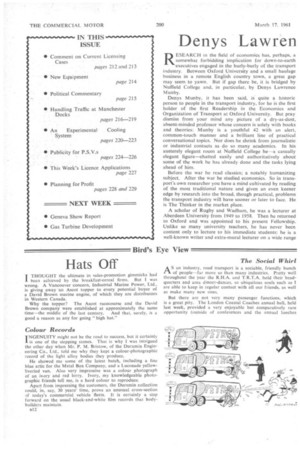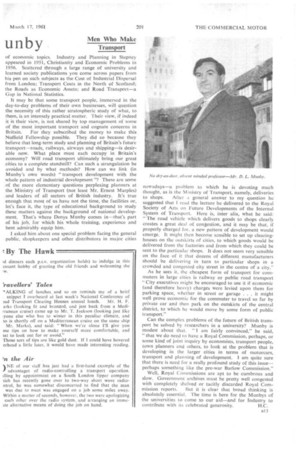Denys Lawren unby
Page 46

Page 47

If you've noticed an error in this article please click here to report it so we can fix it.
Men Who Make Transport RESEARCH in the field of economics has, perhaps, a somewhat forbidding implication for down-to-earth executives engaged in the hurly-burly of the transport industry. Between Oxford University and a small haulage business in a remote English country town, a great gap may seem to yawn. But if gap there be, it is bridged by Nuffield College and, in particular, by Denys Lawrence Munby.
Denys Munby, it has been said, is quite a historic person to people in the transport industry, for he is the first holder of the first Readership in the Economics and Organization of Transport at Oxford University. But pray dismiss from your mind any picture of a dry-as-dust, absent-minded professor whose concern is solely with books and theories: Munby is a youthful 42 with an alert, common-touchmanner and a brilliant line of practical conversational topics. Nor does he shrink from journalistic or industrial contacts as do so many academics. in his austerely elegant room at Nuffield College he—a casually elegant figure—chatted easily and authoritatively about some of the work he has already done and the tasks lying ahead of him.
Before the war he read classics; a notably humanizing subject. After the war he studied economics. So in transport's own researcher you have a mind cultivated by reading of the most traditional nature and given an even keener edge by research into the broad, though practical, problems the transport industry will have sooner or later to face. He is The Thinker in the market place.
A scholar of Rugby and Wadham, he was a lecturer at Aberdeen University from 1949 to 1958. Then he returned to Oxford and was appointed to his present Fellowship. Unlike so many university teachers, he has never been content only to lecture to his immediate students: he is a well-known writer and extra-mural lecturer on a wide range of economic topics. Industry and Planning in Stepney appeared in 1951, Christianity and Economic Problems in 1956. Scattered through a large range of university and learned society publications you come across papers from his pen on such subjects as the Cost of Industrial Dispersal from London; Transport Costs in the North of Scotland: the Roads as Economic Assets; and Road Transport—a Gap in National Statistics.
It may be that some transport people, immersed in the day-to-day problems of their own businesses, will question the necessity of this rather stratospheric study of what, to them, is an intensely practical matter. Their view, if indeed it is their view, is not shared by top management of some of the most important transport and cognate concerns in Britain. For they subscribed the money to make this Nuffield Fellowship possible. They did so because they believe that long-term study and planning of Britain's future transport—roads, railways, airways and shipping—is desirable now. What place must each occupy in Britain's economy? Will road transport ultimately bring our great cities to a complete standstill? Can such a strangulation be avoided and by what methods? How can we link (in Munby's own words) "transport development with the whole pattern of industrial development "2 These are some of the more elementary questions perplexing planners at the Ministry of Transport (not least Mr. Ernest Marples) and leaders of all sectors of British industry. It's true enough that most of us have not the time, the facilities or, let's face it, the type of educational background to study these matters against the background of national development. That's where Denys Munby comes in—that's part of his job, for which his whole training, experience and bent admirably equip him.
I asked him about one special problem facing the general public, shopkeepers and other distributors in major cities
nowadays—a problem to which he is devoting much thought, as is the Ministry of Transport, namely, deliveries to shops. After a general answer to my question he suggested that I read the lecture he delivered to the Royal Society of Arts on Future Developments of the Internal System of Transport. Here is, inter alia, what he said: "The road vehicle which delivers goods to shops clearly creates a great deal of congestion, and it may be that, if properly charged for, a new pattern of development would emerge. It might then become sensible to set up clearinghouses on the outskirts of cities, to which goods would be delivered from the factories and from which they could be sent to the particular shops. It does not seem very sensible on the face of it that dozens of different manufacturers should be delivering in turn to particular shops in a crowded and congested city street in the centre of a city."
As he sees it, the cheapest form of transport for commuters in large cities is railway or public road transport 'City executives might be encouraged to use it if economic (and therefore heavy) charges were levied upon them for parking space, whether in street or garage . . it might well prove economic for the commuter to travel so far by private car and then park on the outskirts of the central district, to which he would move by some form of public transport."
Can the complex problems of the future of British transport be solved by researchers in a university? Munby is modest about that. "I am fairly convinced," he said, "that we do need to have a Royal Commission, perhaps, or some kind of joint inquiry by economists, transport people, town planners and others, to look at the problem that is developing in the larger cities in terms of motorcars, transport and planning of development. I am quite sure that there is need for a really profound study of this issue— perhaps something like the pre-war Barlow Commission."
Well, Royal Commissions are apt to be cumbrous and slow. Government archives must be pretty well congested with completely shelved or tacitly discarded Royal Com mission reports, But it is clear that broad thinking is absolutely essential. The time is here for the Munbys of the universities to come to our aid—and for Industry to contribute with its celebrated generosity. H.C.




































































































































